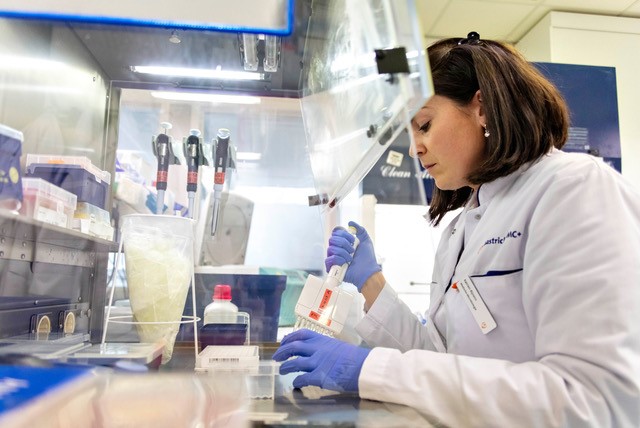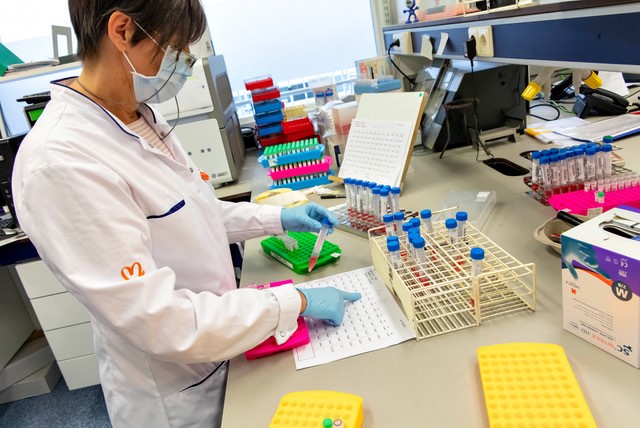“We immediately stepped up and focused on COVID diagnostics”
From the beginning of the COVID-19 pandemic, staff of the Department of Medical Microbiology at the Maastricht University Medical Centre+ has been working overtime. Many of the COVID tests that are done in Limburg are analysed here. “Our people have been working tirelessly for over a year. The tests just keep coming”, says Paul Savelkoul, professor of Medical Microbiology at CAPHRI.

Savelkoul is also the head of the Department of Medical Microbiology, which has been working closely together with Public Health Service South Limburg for years. “When the pandemic hit, we immediately stepped up and focused all our efforts on processing COVID tests”, says his colleague Petra Wolffs, an assistant professor and the chair of the CAPHRI research line of Health Inequities and Societal Participation (HISP). The department receives and analyses samples from municipal health service testing sites, but also from places like general practices and the hospital. “We decided quite early in the pandemic to set up a separate laboratory for this purpose. We also hired about 25 new employees, from analysts to support staff. This allowed us to increase our testing capacity along with the increasing number of tests, thanks in part to the equipment we received from the Dutch Ministry of Health, Welfare and Sport.”
Identifying variants
Their employees are very committed, says Petra Wolffs. “COVID-19 testing is being done every day and continuing for longer each day. Even though our employees are working more evening and weekend shifts, we’re seeing low levels of absenteeism. I'm proud of us for showing what we can achieve when push comes to shove. And COVID has also opened doors: we’ve started working together more at both the regional and national level.”
In the current phase of the pandemic, she says, more emphasis is being placed on identifying coronavirus variants. Maastricht is one of the three laboratories in the Netherlands performing advanced analyses of different variants of the virus. For example, it tracks which variants are circulating and how common they are in the region. The department is also studying the effectiveness of the vaccine against the different variants. “This type of research requires both advanced technology and expert knowledge”, explains Paul Savelkoul. “That’s why only a few places in the country are capable of doing it. We possess this particular combination of knowledge and technology because of our research on antibiotic resistance.”

Antibiotic resistance
These research activities weren’t paused due to COVID-19. In fact, Medical Microbiology has continued all its normal activities during the pandemic. “One of our main tasks is medical diagnostics, ranging from STI and HIV to tuberculosis testing”, explains Paul Savelkoul. Two other important tasks of the department are teaching and research. “Our goal is to improve public health, specifically microbiological health. It’s very much aligned with CAPHRI’s overall goal.” Take, for example, their research on preventing antibiotic resistant bacteria in the population. It’s being conducted both at the Euroregional level and within LINK, the regional network for infection prevention and antibiotic resistance in Limburg. In this network, Medical Microbiology is working together with a variety of regional partners, including municipal health services, general practitioners, hospitals, nursing homes, physical rehabilitation centres, care for people with intellectual disabilities, mental health care, childcare centres and pharmacies. “The network promotes the judicious use of antibiotics – through training courses for health professionals (www.minc.eu), for example – in an effort to reduce unnecessary antibiotic prescribing.”
Judicious use
The judicious use of antibiotics is extremely important for the health of the population, says Paul Savelkoul. “Antibiotic resistance is a silent epidemic that may have a much greater impact on public health than COVID-19 in the long run. Most of the bacteria in the human body, about 98 per cent, are bacteria we need. They protect us. Antibiotics destroy these ‘good’ bacteria. If the 2 per cent of pathogenic bacteria in our bodies subsequently become resistant to antibiotics, we will soon see infectious diseases that are impossible to treat. We must do something about this.” That’s why working together in LINK is so important, he says. “We also raise awareness about infection prevention and hygiene practices, such as washing your hands with soap to reduce the transmission of antibiotic resistant bacteria. A lot of people started disinfecting their hands with alcohol-based solutions during COVID. It helps reduce the spread of the virus, but it’s not a good development in the long term. Alcohol-based solutions kill our healthy bacteria, which protect us from bad bacteria. The pandemic may also lead to parents raising their children in an environment that is too clean, which negatively affects the development of the immune system.” But, concludes Petra Wolffs, the pandemic has also helped the fight against infectious diseases in some ways. “People have become more aware of how quickly infectious diseases can spread internationally. And people are less likely to get infections if they follow all the rules and restrictions, like washing your hands and keeping your distance.”
"Antibiotic resistance is a silent epidemic that may have a much greater impact on public health than COVID-19 in the long run."
Prof. Paul Savelkoul
Also read
-
Macrophages as key to treating liver fibrosis
Sabine Daemen is researching how certain macrophages can slow down fatty liver disease and fibrosis in order to develop new therapies.

-
Teacher Information Points at UM
UM faculties now host Teacher Information Points (TIPs) that offer local, “just-in-time” and on-demand support for teaching staff. The aim is simple: to provide help that is closely connected to day-to-day teaching practice.

-
More than a student job: five alumni about their unique role in groundbreaking vascular research
What is it like to take part in cutting-edge vascular research as a student, standing in the operating room, directly responsible for handling patient material? Five alumni of the Maastricht MAPEX student team share what they learned, the challenges they faced, and how this experience shaped their...
